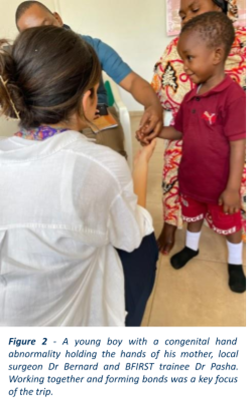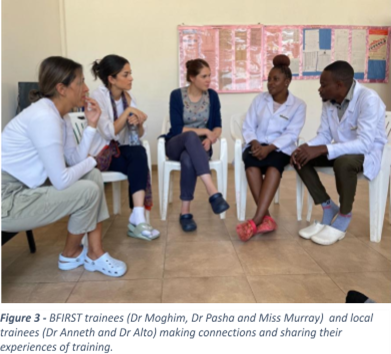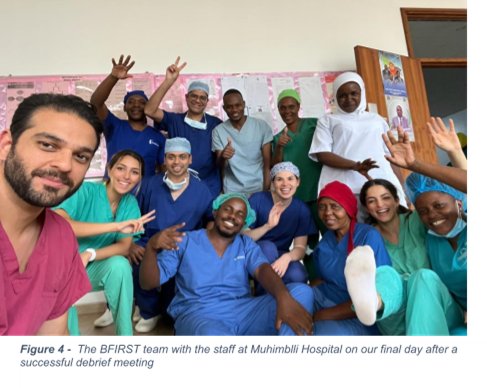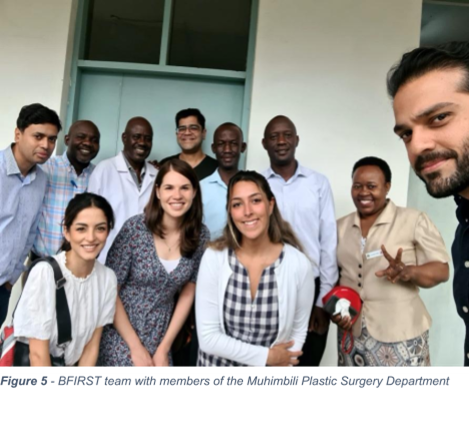Aims
Our principal aims are:
- Teaching and Training of Local Teams
- Capacity Building and Coordination of Local Teams
We aimed to achieve this through:
- Continuing to strengthen relationships with local surgical teams at Tumbi Regional Referral Hospital, identifying surgeons with an interest in plastic surgery to support and train.
- Forge new bonds with the plastic surgery department of the national Muhimbili Hospital to provide clinical and surgical training on identified gaps of local plastic surgery provision.
- Service provision through running clinics and theatre lists for patients identified by the local team with conditions beyond the scope of the local surgeons training, such as congenital hand abnormalities and burns-related complications.
- Collaborate with the local teams to agree on a long-term multi-year plan of improving overall plastic surgery training in a sustainable and co-ordinated manner.
What we did
| Our visit mainly took place at the Tumbi Regional Referral Hospital in Pwani region of Tanzania. Tumbi Hospital has orthopaedics and general surgery but currently no plastic surgeons. Due to our historic links with the local team here, we were able to run two days of clinics with patients whom the local team had prepared for us. The cases were mainly paediatric patients with congenital hand abnormalities such as syndactyly and late presentations of burn-related deformities such as burns contractures. With the local team present, we assessed which patients were suitable for surgical intervention, whilst training the junior interns on hand examinations, assessment of limb function and how to know when to operate and not to operate. |
 |
| Whilst some of our team ran the clinics, other members attended meetings with the only plastic surgery department in Tanzania, Muhimbili National University Hospital. Here we established new connections with the local plastic surgery team, gained an understanding of their current plastic surgery training programme and identified gaps within the plastic surgery service provision. We agreed on a joint collaboration with the aim of improving their current plastic surgery training programme, which currently consists of a two-year Master of Science in surgery, and improve the range of plastic surgery care they are able to provide. They particularly highlighted the need for hand surgery, acute care management and microsurgery. Finally, we ran two days of theatre lists in Tumbi Hospital, providing training for the general surgeon attending, the two junior interns and one of the plastic surgery trainees from Muhimbili Hospital. Where possible, the local surgeons either led or assisted in the operations to ensure they gained exposure and training in managing these cases. |
 |

We completed the week by having a final meeting with the entire Tumbi Hospital theatre team including the scrub nurses, ODPs, surgeon attending and junior doctors. We discussed what went well, such as the structure of the clinics, the clinical database we have created to keep track of the patients seen, and the exposure the local team gained in operating on the cases. We also looked at what could be improved for future visits, such as better communication between the two teams, updates on patient follow-up from cases managed, and establishing a clear criterion of referral for the plastic surgery team.
We also observed that the WHO Surgical Safety Checklist was not always used or, when it was, not comprehensively filled out. After discussion with the anaesthetic team and OPDs, the main barrier to using the checklist was language. Their checklist was in English whilst many of the staff spoke Swahili only. As the WHO website did not have a Swahili version of the checklist, the BFIRST trainees collaborated with the Tumbi trainees to translate the checklist into Swahili and agreed to print these out and ensure their local teams use these. We agreed to follow-up their compliance with this in future visits.

Lessons learnt
- Long-term relationships with multiple regular visits will be required to achieve true impact of increased high quality plastic surgery provision.
- Gained insight into the healthcare structure and referral systems in Tanzania.
- Learned about the current plastic surgery training programme at the national hospital and identified gaps in plastic surgery service provision.
- Trainees form a valuable member of global surgery teams as they can forge relationships with local trainees quickly, provide organisation and coordination to trips and patient data, and provide a unique set of skills to a consultant-led team.
- We gained an understanding of funding structures within regional hospitals. Whilst the operation fee was waived, the patients struggled to pay for bus fares to the hospital and the cost of hospital facilities. This will be taken into consideration in future trips.
Future
This trip marks the beginning of a collaboration with the plastic surgery department at Muhimbili National Hospital with the objectives to:
- Assist in growing their current plastic surgery training programme through offering fellowships, encouraging attendance of BFIRST webinars, identify areas for improvement in their Master of Science curriculum, and regular in-person training from the BFIRST team.
- Support them in long-term goals of establishing a hand surgery service, training in microsurgery and management of acute plastic surgery cases.
- Co-ordinate the various teams to support them in establishing a national referral service.
Further to this, we hope to continue growing our links with the referral hospitals Tumbi and Temeki, providing training and collaborating on establishing a streamlined service locally and sustainably.
Members of the BFIRST Team returned from a successful trip this month. We will bring you an update shortly.

